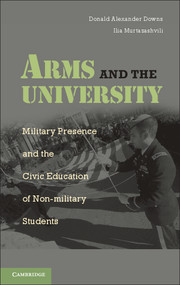Book contents
- Frontmatter
- Contents
- Tables
- Acknowledgments
- Part I A Normative and Pedagogical Framework
- Part II ROTC and the University
- 3 ROTC and the University
- 4 ROTC and the Ivies
- 5 ROTC and the Ivies
- 6 ROTC, Columbia, and the Ivy League
- 7 Post-DADT
- 8 Pedagogy and Military Presence
- 9 Winning Hearts and Minds?
- Part III Military History Examined
- Part IV Concluding Thoughts
- Index
- References
3 - ROTC and the University
An Introduction
Published online by Cambridge University Press: 05 June 2012
- Frontmatter
- Contents
- Tables
- Acknowledgments
- Part I A Normative and Pedagogical Framework
- Part II ROTC and the University
- 3 ROTC and the University
- 4 ROTC and the Ivies
- 5 ROTC and the Ivies
- 6 ROTC, Columbia, and the Ivy League
- 7 Post-DADT
- 8 Pedagogy and Military Presence
- 9 Winning Hearts and Minds?
- Part III Military History Examined
- Part IV Concluding Thoughts
- Index
- References
Summary
First comes the courage of the citizen-soldier; for this is the most like true courage. Citizen-soldiers seem to face dangers because of the penalties imposed by the laws and the reproaches they would otherwise incur; and because of the honours they win by such action; and therefore those peoples seem to be bravest among whom cowards are held in dishonour. This is the kind of courage that Homer depicts.
– AristotleThe most successful tyranny is not the one that uses force to assure uniformity, but the one that removes awareness of other possibilities.
– Allan BloomAs we have stressed in the first two chapters, a liberal or civic education involves a process of conflict between an individual’s preconceived beliefs and the beliefs of others as they update their views based on their exposure to competing and contrasting ideas. Some of the greatest contrasts are between student-soldiers and civilians on campus. The university often involves an active, physical presence of the military on campus in the form of ROTC – a presence that has often engendered tensions, as we will discuss in the following chapters. It also raises questions that we will seek to answer. What are the benefits of physical presence of student-soldiers – primarily through ROTC – for a university? Are there conflicts between civilians and student-soldiers? What explains the emergence, decline, and resurgence of ROTC on campus? These questions are critical to understanding the relationship between arms and the university – ones to which we hope to offer preliminary answers in the chapters that follow.
Information
- Type
- Chapter
- Information
- Arms and the UniversityMilitary Presence and the Civic Education of Non-Military Students, pp. 77 - 102Publisher: Cambridge University PressPrint publication year: 2012
